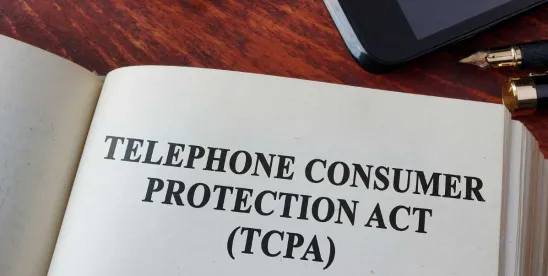Well, folks, it’s Blake Landis, one of Troutman Amin’s newest additions, who will give you the latest scoop. It looks like Jeg’s Automotive LLC has drifted into some legal hot water with a filing by LawHQ. You know about LawHQ, right? The innovative app aims to give the TCPA some heat by letting users turn unwanted calls and texts into lawsuits with just a swipe. I’m not talking about Bumble, Hinge, or Tinder either (don’t ask me how I know those apps).
LawHQ apparently has 3 patents with the USPTO that I was reading into last night regarding their “intelligent electronic signature platform.” Super interesting stuff how the platform works. If you use their app according to their terms of service, you basically agree that they can access the information you authorize them to access within the app’s usage. The app and I quote “may” include your call logs, contact list, calls, text, or voicemails that the user reports as spam on the app, and I quote “or” their system identifies as spam. Privacy concern’s anyone? Am I the only one with contacts saved on my phone that say “DO NOT ANSWER”? I’ll digress. I assume people using the app are ready to relinquish it all to get those spammers to cough up some money.
Anyway, moving on, a new lawsuit, Kratzer v. Jeg’s Automotive LLC, 2:24CV04140, filed in U.S. District Court, Western District of Missouri, asserts the automotive parts retailer of going pedal to the metal with the spam texts, blowing right through the plaintiff’s stop signs. Buckle up, and let’s take this case for a spin!
The lawsuit, brought by a Missouri man, claims that Jeg’s Automotive violated the TCPA by sending 134 unsolicited marketing texts after he told them to pump the brakes. Under the TCPA, each text could carry $500 to $1500 in statutory damages. Here, they request $1500 for each violation because they claim it was KNOWING. See 47 U.S.C. § 227(b)(3) (authorizing “an action to recover for actual monetary loss from such a violation, or to receive $500 in damages for each such violation, whichever is greater” and providing that “court may, in its discretion, increase the amount of the award to an amount equal to not more than 3 times the amount available under subparagraph (B) of this paragraph” for willful or knowing violations).
But does Kratzer’s case have the horsepower to go the distance? Let’s peek under the hood:
For starters, the TCPA requires companies to maintain internal do-not-call lists and honor opt-out requests. See 47 C.F.R. § 64.1200(d). Missouri’s anti-spam law also prohibits “knowing and willfully” sending solicitation calls to consumers who said please make it stop. See Mo. Rev. Stat. § 407.1076(4). Courts have made it clear that texts count as calls within the compass of §227(b)(1)(A)(iii). See Campbell-Ewald Co. v. Gomez, 577 U.S. 153 (2016).
Here, Kratzer says he hit Jeg’s with multiple stop requests, but they kept their foot on the gas and the spam coming. Courts have previously held that continuing to send unwanted texts after being told to stop is a big TCPA no-no. If Kratzer’s allegations are true, Jeg’s could be looking at a hefty bill.
But wait, there’s more! Thanks to the magic of the Wayback Machine (a digital archive of the World Wide Web), we can see what Jeg’s website looked like back in the day. And guess what? According to the Wayback Machine, Jeg’s website was first updated in March 2021 to include this little gem:
“SIGN-UP FOR TEXT MESSAGES AND SAVE! Sign Up By subscribing to JEGS SMS, you consent to receive autodialed messages to the number used at opt-in. Msg. freq may vary. Msg & data rates may apply. Reply HELP for help or STOP to opt out.”
Interesting, right? So Jeg’s apparently did have an opt-out mechanism in place. Which begs the question: did Kratzer’s texts really have no opt-out function? Did he enter his phone number on the website to give consent? Did he forget to send STOP, or somehow, it magically failed to send? Or did he wait for 134 texts to accumulate before taking action? Inquiring minds want to know!
Now, I know what you’re thinking. The Wayback Machine? Isn’t that hearsay? Well, yes, and no. See Gilfus v. McNally Capital, LLC, 8:18-cv-2941-CEH-CPT, 2022 U.S. Dist. LEXIS 160511, 2022 WL 4079587, *3 (M.D. Fla. Sept. 6, 2022) (Honeywell, J.) (printouts from the Wayback Machine must be authenticated by an affidavit from someone with personal knowledge of how the Wayback Machine functions, such as an Internet Archive employee). While it may not always be admissible in court, it’s still an excellent tool for attorneys (and other practitioners) for investigating and building cases. Plus, it’s plain fun to see what websites looked like back in the day. You can mess around with the website here: Wayback Machine. Remember GeoCities, anyone?
If it is found that Jeg’s did not have an internal DNC list and ignored multiple “unsubscribe” requests, that’s a lot of damage control. Let this be a cautionary tale for companies sending mass marketing texts.
Of course, we’re still in the early laps of this case, so it’s too soon to hand Kratzer the checkered flag. Jeg’s hasn’t even filed an answer yet. Once they do, we’ll see what defenses they raise. One thing’s for sure: this will be one to watch for companies and consumers alike as it navigates the legal turns ahead. We’ll keep you posted as it moves through the courts.
Talk soon!




 />i
/>i

